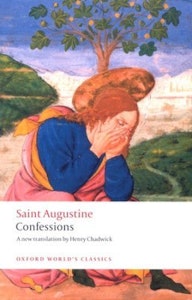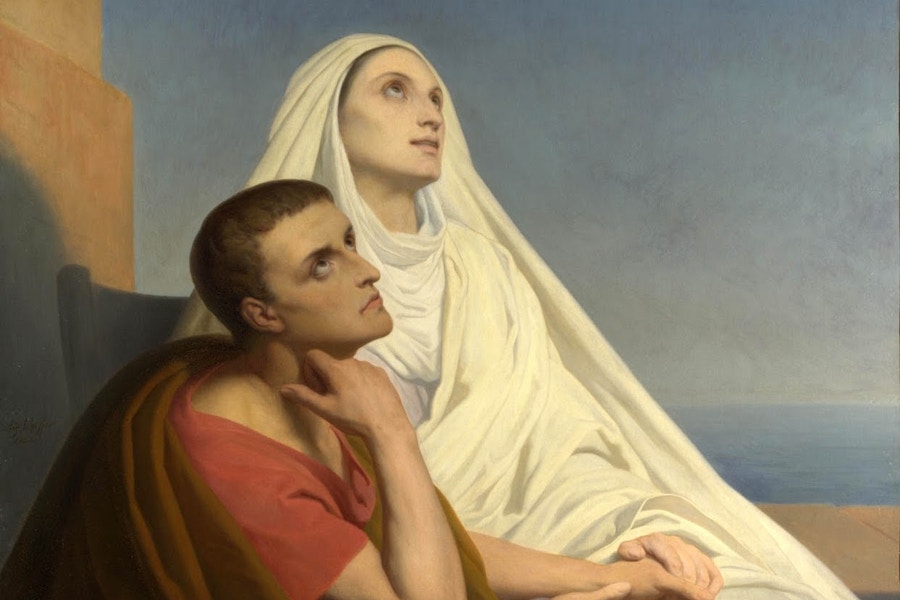Introductory Note:
Monica of Hippo was an early Christian saint and the mother of St. Augustine of Hippo. She is remembered and honored in most Christian denominations, albeit on different feast days, for her outstanding Christian virtues, particularly the suffering caused by her husband’s adultery, and her prayerful life dedicated to the reformation of her son, who wrote extensively of her pious acts and life with her in his Confessions. Popular Christian legends recall Saint Monica weeping every night for her son Augustine.
As we approach Mother’s Day this week, we hope that reading Augustine’s tender tribute to the faithful tenacity of his mother will bring some comfort to troubled mothers (and fathers) who are worried about their children, and help the rest of us to appreciate anew how efficacious the ceaseless prayers of our parents have been.
Renovaré Team
 Excerpt from Confessions
Excerpt from Confessions
CHAPTER XI.
19. And now thou didst “stretch forth thy hand from above” and didst draw up my soul out of that profound darkness [of Manicheism] because my mother, thy faithful one, wept to thee on my behalf more than mothers are accustomed to weep for the bodily deaths of their children. For by the light of the faith and spirit which she received from thee, she saw that I was dead. And thou didst hear her, O Lord, thou didst hear her and despised not her tears when, pouring down, they watered the earth under her eyes in every place where she prayed. Thou didst truly hear her.
For what other source was there for that dream by which thou didst console her, so that she permitted me to live with her, to have my meals in the same house at the table which she had begun to avoid, even while she hated and detested the blasphemies of my error? In her dream she saw herself standing on a sort of wooden rule, and saw a bright youth approaching her, joyous and smiling at her, while she was grieving and bowed down with sorrow. But when he inquired of her the cause of her sorrow and daily weeping (not to learn from her, but to teach her, as is customary in visions), and when she answered that it was my soul’s doom she was lamenting, he bade her rest content and told her to look and see that where she was there I was also. And when she looked she saw me standing near her on the same rule.
Whence came this vision unless it was that thy ears were inclined toward her heart? O thou Omnipotent Good, thou carest for every one of us as if thou didst care for him only, and so for all as if they were but one!
20. And what was the reason for this also, that, when she told me of this vision, and I tried to put this construction on it: “that she should not despair of being someday what I was,” she replied immediately, without hesitation, “No; for it was not told me that ‘where he is, there you shall be’ but ‘where you are, there he will be’”? I confess my remembrance of this to thee, O Lord, as far as I can recall it — and I have often mentioned it. Thy answer, given through my watchful mother, in the fact that she was not disturbed by the plausibility of my false interpretation but saw immediately what should have been seen — and which I certainly had not seen until she spoke — this answer moved me more deeply than the dream itself. Still, by that dream, the joy that was to come to that pious woman so long after was predicted long before, as a consolation for her present anguish. Nearly nine years passed in which I wallowed in the mud of that deep pit and in the darkness of falsehood, striving often to rise, but being all the more heavily dashed down. But all that time this chaste, pious, and sober widow — such as thou dost love — was now more buoyed up with hope, though no less zealous in her weeping and mourning; and she did not cease to bewail my case before thee, in all the hours of her supplication. Her prayers entered thy presence, and yet thou didst allow me still to tumble and toss around in that darkness.
CHAPTER XII
21. Meanwhile, thou gavest her yet another answer, as I remember — for I pass over many things, hastening on to those things which more strongly impel me to confess to thee — and many things I have simply forgotten. But thou gavest her then another answer, by a priest of thine, a certain bishop reared in thy Church and well versed in thy books. When that woman had begged him to agree to have some discussion with me, to refute my errors, to help me to unlearn evil and to learn the good — for it was his habit to do this when he found people ready to receive it — he refused, very prudently, as I afterward realized. For he answered that I was still unteachable, being inflated with the novelty of that heresy, and that I had already perplexed divers inexperienced persons with vexatious questions, as she herself had told him. “But let him alone for a time,” he said, “only pray God for him. He will of his own accord, by reading, come to discover what an error it is and how great its impiety is.” He went on to tell her at the same time how he himself, as a boy, had been given over to the Manicheans by his misguided mother and not only had read but had even copied out almost all their books. Yet he had come to see, without external argument or proof from anyone else, how much that sect was to be shunned — and had shunned it. When he had said this she was not satisfied, but repeated more earnestly her entreaties, and shed copious tears, still beseeching him to see and talk with me. Finally the bishop, a little vexed at her importunity, exclaimed, “Go your way; as you live, it cannot be that the son of these tears should perish.” As she often told me afterward, she accepted this answer as though it were a voice from heaven.
Excerpted from Confessions by Augustine of Hippo, in the public domain via Catholic Spiritual Direction.


